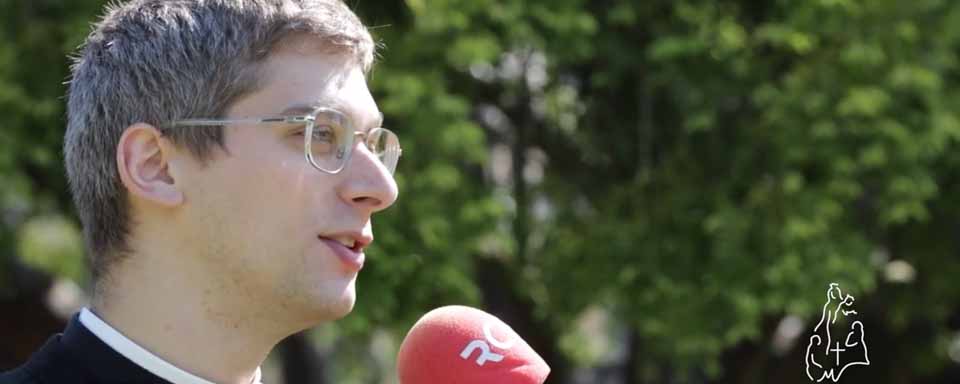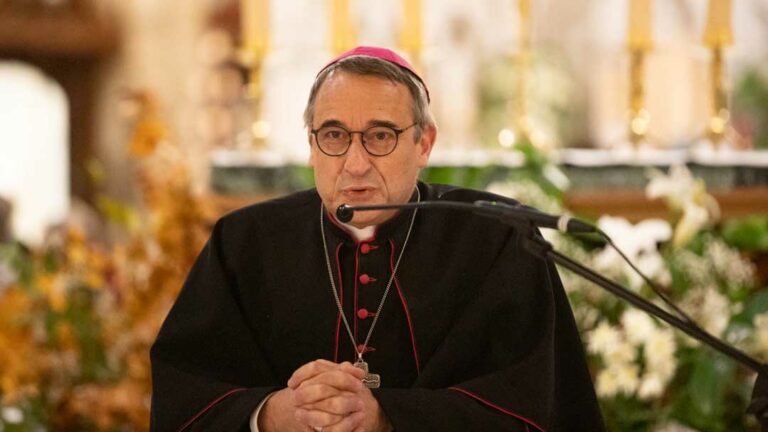“Outside the Church, no salvation” . In our day and age, at the start of the twenty-third century, to most people this precept appears as slightly narrow-minded. Let us present the question in a different manner: can one go to Heaven without being baptised? Rev. Fr. Axel de Perthuis reviews the question for the French Catholic Radio show on Normandy shrines (RCF Orne, Calvados, Manche)
The Gospel seems to indicate that baptism is demanded for salvation. For example, let us contemplate what Jesus said to Nicodemus: “Amen, amen, I say to you, no one can see the kingdom of God without being born from above.” (Jn 3, 5). Or again: “I am the way and the truth and the life. No one comes to the Father except through me (Jn 14, 6). In another passage, Jesus told his disciples : “Go into the whole world and proclaim the gospel to every creature. Whoever believes and is baptised will be saved; whoever does not believe will be condemned.” (Mc 16, 15). These statements demonstrate that the way God wills to save us is through Jesus. And to get on this very way one has receive baptism.
However, we need to pay close attention to this passage in St. Mark. Jesus says that anyone who has heard the evangelic predication and refused to believe is condemned. This does not apply to those who have simply never heard of Him. When the Fathers of the Church devised the adage: “Outside the Church, no salvation”, they were primarily referring to people who voluntarily segregated from the Church through schism or heresy.
This being said, the grace of baptism is necessary to all in order to be saved. We have all been marred by original sin, and need to be cleansed of it so as to reach Heaven. The Church recognises that, in certain cases, God may bestow this grace to some people without their baptism having been materially administered.
Can one really refuse God?
In every human being dwells a desire for absolute, for what is good and true, and to see God. But this aspiration can be blocked out by many things. Respecting people’s freedom is essential, and in particular their right to reject the Lord. In other words, when we want to save everyone, we don’t respect anyone’s freedom. God wants to save all men, but he also wants us to freely contribute to our salvation, by choosing what is good under the motion of his grace.
Can baptism be considered a tool?
The sacraments are the sacraments of faith. The good thief was not baptised in the name of the Father, the Son and the Holy Spirit, but he believed in Jesus and, by means of his faith in Him, he got transformed by the Holy Spirit. So the real key to salvation is faith.
The ordinary way to believe and be saved is through baptism. But God is not bound by his sacraments: He has been able to grant the grace of salvation to millions of people who did not have the opportunity to explicitly ask for baptism, but who mysteriously lived by God’s grace, in their conscience, and who would have asked for baptism had they heard about Jesus.
Should we worry that, in Europe, in a world not really Christian, more and more people have never heard of Jesus, and have no idea of God?
The Church reminds us that she knows no other way than baptism to enter eternal beatification. Her mission is to preach Jesus Christ and the Good News to all. This mission compels Christians for we can’t just sit back and thinking that God can save everyone. The customary way to be saved remains baptism, one cannot ignore it and pledge that God will let it all slip. We are all marred by original sin from the moment we were born, and therefore need to be cleansed of it if we are to have access to God. The normal way to be washed clean is through the sacraments and baptism.
Will a catechumen preparing for baptism be saved should he die before receiving the sacrament?
In my opinion, it is almost certain. Indeed the catechumen’s funerals will be carried out by the Church, like for any baptised person, because his or her wish to be baptised is taken into account.
The Church recognizes substitutes for baptism. For example, blood baptism for unbaptised martyrs who died confessing Christ, or baptism of desire for catechumens. And then, more broadly, for all those who had an implicit desire to receive baptism, i.e. those who would have asked for it if they had known about it.
Does being baptised automatically mean being saved?
The waters of baptism cleanses our soul. However, we still have to live by such grace that the Lord offers. The Lord does not will to save us in spite of ourselves. He wills us to cooperate as well by means of our freedom, by doing good, and by seeking conversion in our everyday lives, and by doing penance for our sins.
Is baptism to be solely administered by priests?
In absolute terms, as long as they are willing to do what the Church requires, anyone -even non-Christians- can baptise. Before its independence, Muslim midwives in Algeria under France protectorate were taught to baptise Christian infants on the verge of dying shortly after birth. Of course, no question to use such measures unless in utter emergency!
Moreover, in the case of adults, the person seeking to be baptised must show the will to do so. For a child, this is not the case. Nowadays, people tend to let their children choose, and therefore not have them be baptised as young ones, claiming that when they grow up they can choose for themselves. But what if they don’t?
It’s not a matter of making parents feel guilty for having realised the necessity for baptism only once their children are grown ups and have become independent. Despite their being unable to have them baptised, they are nevertheless able to pray for them.
What about a baptism administered by force?
A baptism administered to an adult who did not want to receive it is not valid. It is not a baptism. We would love salvation to be immediate, at the snap of fingers, yet we have to trust in God, who guides every human being in the long run. Accordingly God looks at the whole of life and leads each person by respecting them as well as their time.
What’s more, the question is not so much about having received baptism but to live off it. If a person receives baptism but then turns away from God, what good? That is why, usually, catechumenate (duration of preparation prior to receiving baptism) is substantial.




